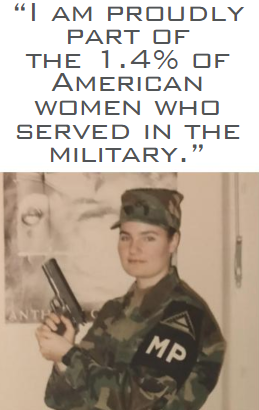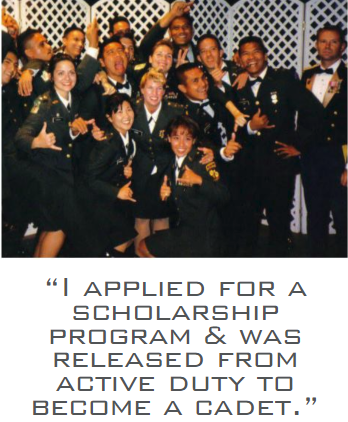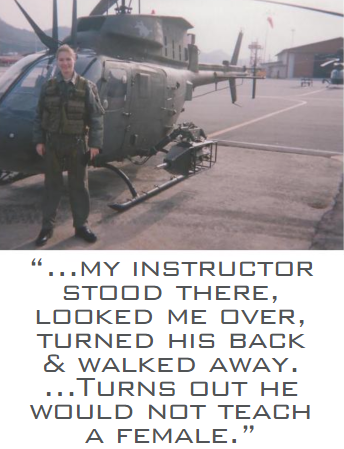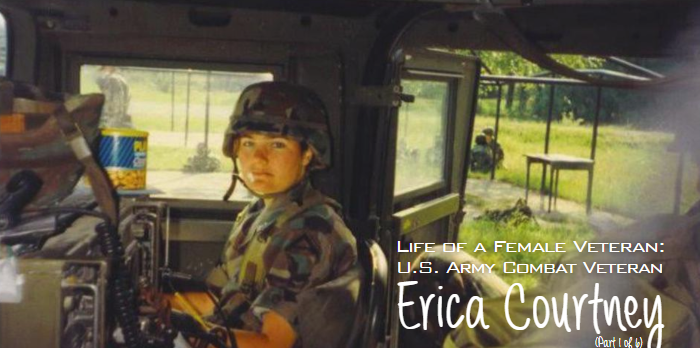I am proudly part of the 1.4 percent of American women who served in the military. The day I signed the paperwork to join as a teenager the Gulf War kicked off and I watched tanks fire through the night on TV thinking, “What in the world did I do?” Having grown up in surf city USA (Huntington Beach, CA), I was never exposed to the military. To emphasize this point, the first time I walked into an Army recruiting office I had sand in my hair and sun-kissed skin; I was with a friend of mine and said, “Hi, I am thinking about joining the Marines,” not even understanding the difference in services. The recruiter took a few looks at us, confused, and had to be thinking, “Sucker!” Having always been athletic and adventurous, I thought why not. I would rather try something and hate it than wonder what it would have been like. College was a bore and I was ready for the unknown.

“Get off the bus, you maggots!” Welcome to Military Police Basic Training. What was wrong with these people? Why so much yelling? Okay, bag in hand off the bus I went into the barracks. This is actually where Hollywood gets it right. There’s lots of yelling, climbing, learning, bonding and trying to stay under the radar. Except, I learned early on that was pretty hard for me. I was a runner breaking six-minute miles, and one particular drill sergeant could not stand that there was a female in his fast group and did whatever he could to break me. He was an infantry man where they did not work with women. There were many days of unnecessary hazing to the point he was counseled by the officers. He tried to make me cry, but failed. Many more attempts would follow. I learned early, never let them see you sweat and there is no crying in uniform.
Congratulations. First assignment, Germany. Away from everything I knew. I showed up and was nicknamed Private Benjamin. I was tasked with 12 to 15-hour patrol days and nights responsible for enforcing the Post Commander’s rules and regulations. I was 19 carrying a side arm and had authority most 19-year-olds couldn’t fathom. For any accident that involved an American within 200 miles I would drive out in my VW van with no heater and a blanket draped over me. I’d get out, wipe snow off signs, and arrive to some horrific scenes thanks to the autobahn and no speed limits. The Polezi refused to show up so I had to handle the situations; my first taste of being a first responder and having to show calm and exude control of situations. Our wartime mission dealt with POWs, security and convoy assistance. As the lowest ranking, I got assigned an M60 machine gun then a SAW and had to sleep with this metal thing in my sleeping bag. I was so cold at times I could barely get my fingers to work to shoot, but it’s amazing how warm it gets once in use. After winning over my superiors they assigned me to work with the Criminal Investigation Division infiltrating drug rings and other rackets. This was not my thing. I had a hard time lying about my identity and it did not help that I never touched drugs so I was very uncomfortable. They needed females but I could be put to use better somewhere else.
Next assignment, Fort Dix, New Jersey where a major highway ran right through the middle involving many drug and alcohol busts. I became a patrol supervisor and was promoted to Corporal. I enjoyed my job as it was something new every day. However, I was now ready to go back to college. In Europe I got to travel all over the place and it opened me up to learning. I thought, “If I am going to continue in the Army, why not become an officer and get my degree?” I applied for a scholarship program and was released from active duty to become a cadet. I chose the University of Hawaii, nice beaches and cool drinks here I come. I arrived as a sophomore and had to wind down a bit from my service time. It did, however, give me a leg up as I already knew the basics. As a junior is when we’re really tested, and I learned early that leadership really is an art. What works for one group does not work for another. I had to adjust my style in order to influence and get things done. Most of my fellow cadets were from the islands and I was a mainlander who was a bit more tightly wound. I excelled and became the Cadet Commander as a senior. I made sure they understood how to show up on time, what doctrine was, what to expect in the Army and more. Again, many did not like this but later I heard from many that they now understood why I was as hard on them as I was. My goal was to prepare them. I graduated number one in my class and got my choice of branches. I chose aviation. As a Military Police I used to watch them fly all around as I drove and I thought it would be so cool to see things from the sky.

In flight school I had no idea what to expect. The first six months were basic skills and you would see 10 helicopters hovering, horribly, all over the airfield. Half the day was learning how to fly in the aircraft and the other half was academics. It was an awakening as neither I, nor many others, had any idea how much work this would be. Topics included physics, mechanics, math, anatomy, meteorology, aerodynamics, electronics and more. It was essentially everything and anything that affects the factors of flight. To blow off steam the class would go to Panama City, Florida on the weekends. I especially loved it when I was in civilian clothes and my male classmates behind me wore their flight suits because we all know they join to wear flight suits and get chicks. I would ask them lots of questions and feed a bit into their ego. It was always funny when I would see those same guys later on the airfield and I was wearing that same exact flight suit, and ahead. Who knew? Pass, now onto phase two.
Basic Combat Skills is where you had to learn tactics and how to integrate them into the big picture of multiple moving parts. Pass. Now I got to choose my airframe. I had set out to be an Apache pilot but as chance had it, the scout mission was just about to open up to women. The airframe was the Kiowa Warrior, the most technologically advanced airframe in the Army inventory armed with Hellfires, 2.75 inch rockets and a .50 caliber gun. The airframe has a sight that can see 10 kilometers, day or night, away and laze targets. It was the last airframe, in any service, to allow women to fly. The cavalry mission appealed to me right away. It was not a question, I was going to lead from the front! Day one of training I walked out on the tarmac and my instructor stood there, looked me over, turned his back and walked away. Perhaps he had to go to the bathroom? Time passed, he never came back. Turns out he would not teach a female. I was confused. Having been raised with the belief I could do anything and being a girl did not matter, it was one of my first tastes of gender bias. Much more was to come. Perseverance is the name of the game. Watch out, Cavalry.
My first assignment in aviation I was sent to a hotspot in South Korea. Just a year prior a Kiowa pilot was shot out of the sky for flying to close to North Korea. It was apparent the war never really ended from the 1950’s, just put on hold. This was serious. I was in the Second Infantry Division, in a heavy division cavalry unit closest to the Demilitarized Zone with nothing around but landmines, bridges set to blow, cemeteries and dog farms. Not only was I part of the first group of females to graduate as an aeroscout; I, along with a small handful of other females, was the first at Camp Garry Owen, which at the time did not allow women.

Women were not wanted and the guys made no attempt to hide it. One of the first things I heard, and they did not know me from Adam, was, “Take your fucking tampons and get the hell out of here!” How do you respond to that? These were my subordinates and I was to lead them. This was definitely a leadership challenge; my prior service helped me. I took a deep breath and walked away. Clearly they had a problem but for no other reason than perhaps feeling less manly because a woman was doing the same job? Who knows? One month later I was standing in front of my formation of men, still sensing animosity. I turned around, faced them and asked, “What is the problem here guys?” After some hemming and hawing, one guy spoke up and said, “Well ma’am, if we crash and the aircraft is on fire I don’t think you can get me out.” I thought for a second. Is that it? It all comes back to the physical with men. These guys clearly underestimated my athletic ability and mental toughness. They had no idea and just assumed that a 125-pound female couldn’t possibly be strong. I simply walked to my biggest guy in the formation, about 220 pounds, lifted him in a fireman’s carry position on my back and shoulders and proceeded to walk about a quarter mile to the flight operations center and dropped him at the step. I returned to the formation, found their jaws completely dropped, and asked if I could move on. Dumbfounded, they moved on and had nothing to say after that. I began earning their respect and for those still not on board, I had the senior Warrant Officers police them up. At one point while leading a convoy to gunnery I had to exit my vehicle and pull road guards into place at a dangerous intersection. I needed to get my 10 trucks of fuel, ammo and supplies downrange, safely. When I walked out from the back of my vehicle, a Korean driver cut the corner and struck me. I flew over 100 feet in the air landing on my head and back. I remember blacking out and feeling my legs swing out from under me. I immediately came to, sat up, wiggled my fingers and toes, and my men rushed to my aid thinking I was dead. The helmet I was wearing, the same one all my troops complained about wearing while I insisted, cracked down the center and saved my life. I got up and continued my mission. Word spread and even I was dumbfounded that I was able to walk away with minor injuries. I got in my helicopter the next day and had the highest gunnery qualification score in the unit.
Erica Courtney
CEO of 2020vet and U.S. Army Combat Veteran

 Login
Login

